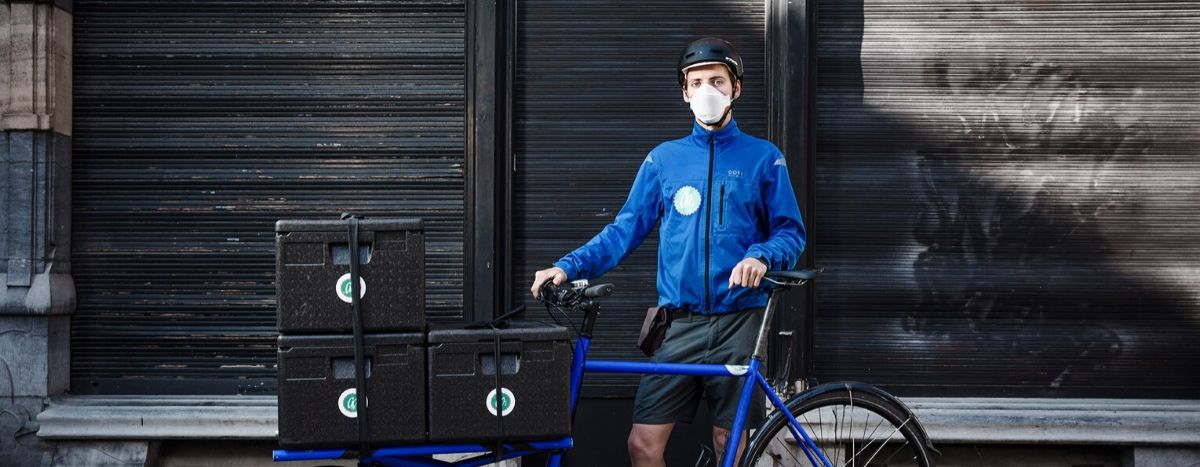
Overcoming the lockdown with bikes and beers
Published on
Translation by:
Kate GallagherHow can your business survive with the closure of bars and restaurants if it relies on the sale of drinks? In Brussels, brewers have collaborated with bicycle couriers to quench the thirst of a population in lockdown. Back in April, when the bars were still closed, we met with these resourceful players of the locked-down economy.
It's another Saturday night spent on virtual evening drinks with friends since the lockdown began one month ago. Despite our distance and anxieties, we continue to toast. On the other side of the screen, my friend Giulia, in the Brussels neighbourhood of Anderlecht, is holding a beer in her hand with a label that I don't recognise. "Where did you buy that?" I ask her. "It arrived this morning. I bought a crate of 24, which they dropped off outside the house for me. It's from a little local brewery." It is almost 8 pm, so now we take a short, routine break to applaud the healthcare workers involved in the fight against Covid-19.
I decide to research this little story about "hops at home" in the most arduous way, to combat my isolation. After three weeks without public transport, on this Wednesday in April I get on the 92 tram line. The atmosphere resembles a Sergio Leone film. Eyes meet, and people are considerate yet suspicious at the slightest cough. I head in the direction of Laeken, up north. Not far from the canal, in a brick building reserved for small businesses in Brussels, we are welcomed by Denys Van Elewyck in the En Stoemelings brewery. This is where Giulia’s case came from before being delivered by couriers from the Dioxyde de Gambettes (GO2) cooperative. At the entrance, Denys offers me some antibacterial hand gel. "We use a lot of it, and that was already the case even before the lockdown, as we work with food," explains Denys. The interview is conducted from a safe distance.
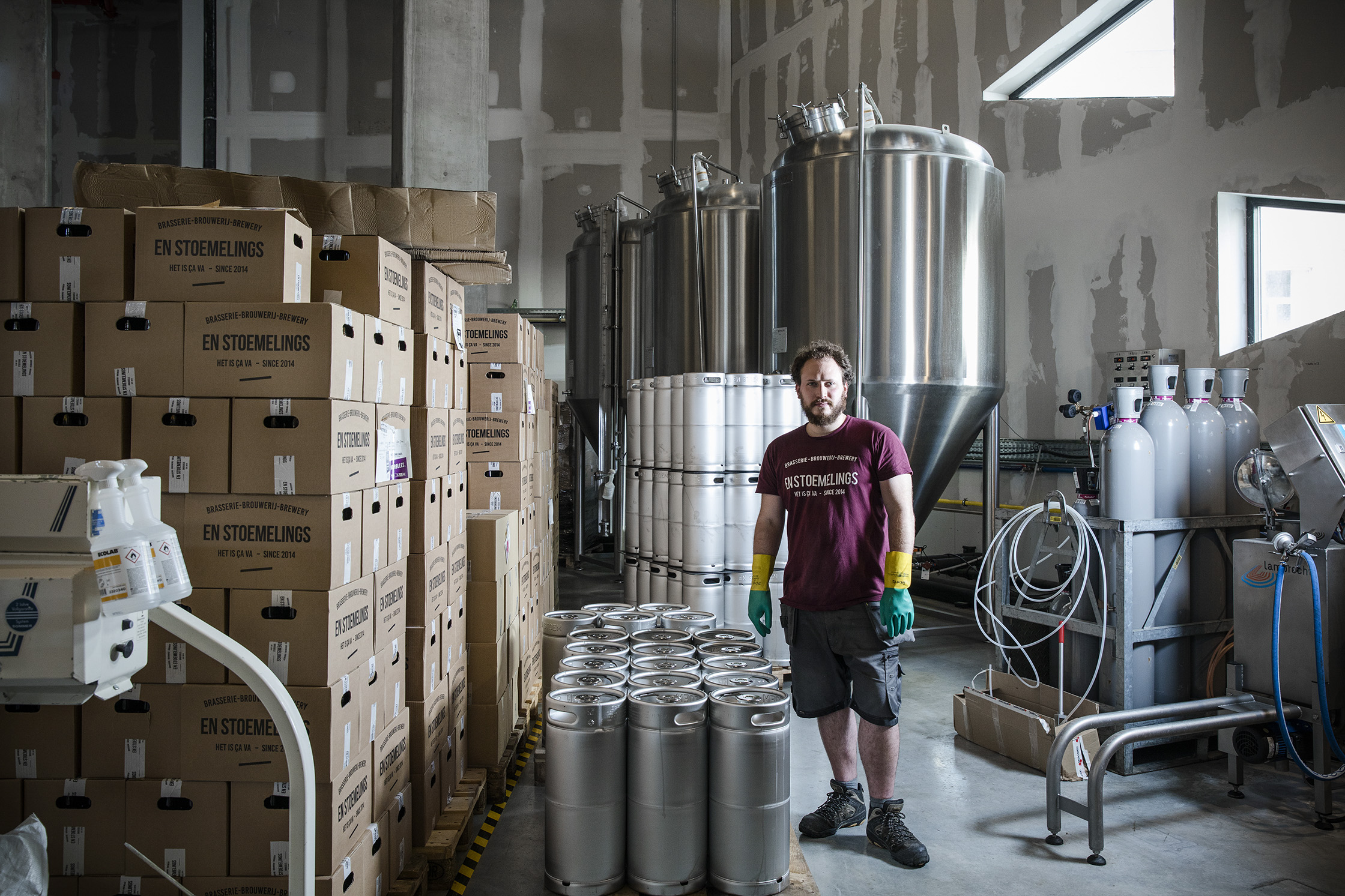
After a week of total shutdown in March, Denys and his brewing partner Samuel Languy got back on track. Within 24 hours, the online store was in operation. The offer for loyal customers to receive their beer at home was launched on Facebook. "We lost 4/5 of our 300 customers," Denys bitterly admits. "But we'd rather carry on. The goal is to maintain at least the connection with direct customers, who we didn't know as well before."
Learning to work differently
Fortunately for them, the rent for the premises was suspended for the time being. The biggest problem is paying the suppliers of raw materials, but Denys and Samuel are trying to resolve that too, especially now thanks to the revenues from the delivery orders. The sales manager now takes care of customer communication, while Denys is mainly in charge of the administrative aspect. "Before, we mainly worked with cafes, restaurants and other breweries. Now we are much more involved in managing relationships with individual customers, before and after delivery. Sometimes they contact us regarding small delays, but often they write to us to say thank you and encourage us to continue." Denys also offers packages including deli meats and local cheeses - everything you need for typically Belgian aperitivo during lockdown.
"Crossing Brussels during this period is a mixture of magic and anxiety."
On a small street nestled between Porte de Namur and Trône, four couriers are ready to take their electric cargo bike out of a large garage, where GO2 is based: a cyclists' cooperative specialising in deliveries for businesses. On the cargo holders are cases of beer. Tall, bearded, with a reassuring smile, Jean-Philippe has been a cycling courier for about two years, after a previous career in the administration department of an NGO. He has gone from the constraints of a screen teeming with Excel files, to the freedom of riding a bike in the city. "Crossing Brussels during this period is a mixture of magic and anxiety," he says. "There is very little human presence and nature seems to dominate with this fantastic weather."
After a period of being in quarantine, he got back on his bike when the cooperative offered to commute between seamstresses involved in the production of fabric masks, and associations that distributed them. "In that moment, I felt useful to society again." Among the couriers, the first to get back in the saddle was Jack, a 26-year-old Australian, who has lived in Belgium for about two years. "I considered myself among the least vulnerable to the virus, seeing as I'm young and fit. It may have been a gamble, but I'm really just so happy when I'm cycling, even if it's for work." Baptistine started working again after a two-week break. It was her body that asked her to return to work first and foremost. "After a week I couldn't sleep. I was waking up six times a night. Now that I've started again, after five hours on my bike, I get home at the end of the day tired enough to rest and feel better.”
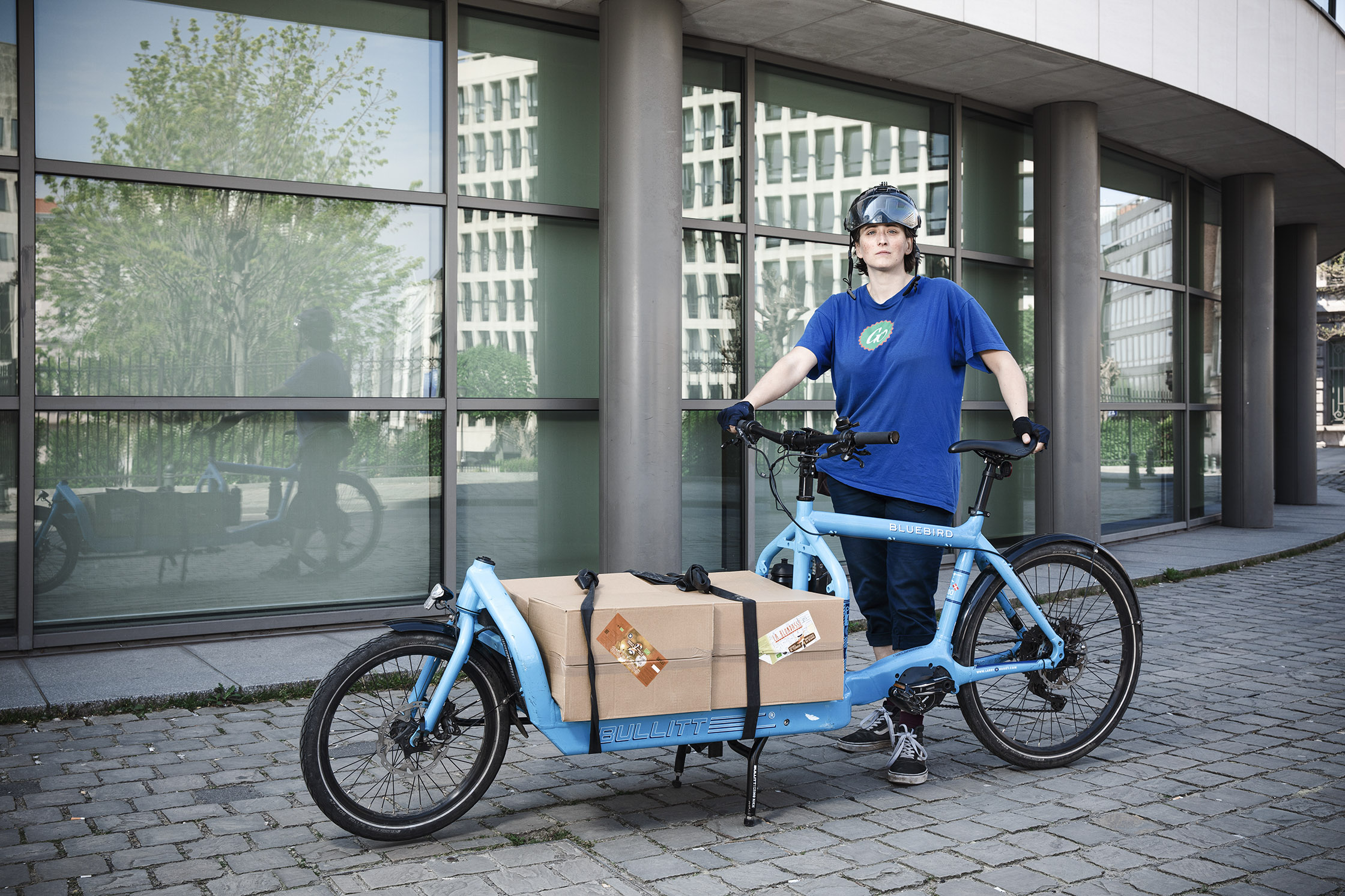
In the GO2 garage, distance, hygiene and cooperation have become watchwords. Before and after the delivery service, everyone washes the bike, including the handlebars, pedals, battery, and cargo holder. The rules are evolving in accordance with government guidelines. Every evening, an e-mail is sent to the couriers informing them of the safety regulations, outlining the schedules and the list of deliveries. Like the rules on social distancing, planning during this period is more flexible and is formulated day by day. Today's delivery route is through the neighbourhoods of Forest, Saint-Gilles, Uccle. "It's mainly the residential areas, which have not changed much during the lockdown," says Baptistine, while some places are unrecognisable. For example, the area around the North Station, which I used to avoid, I now find pleasant to go through."
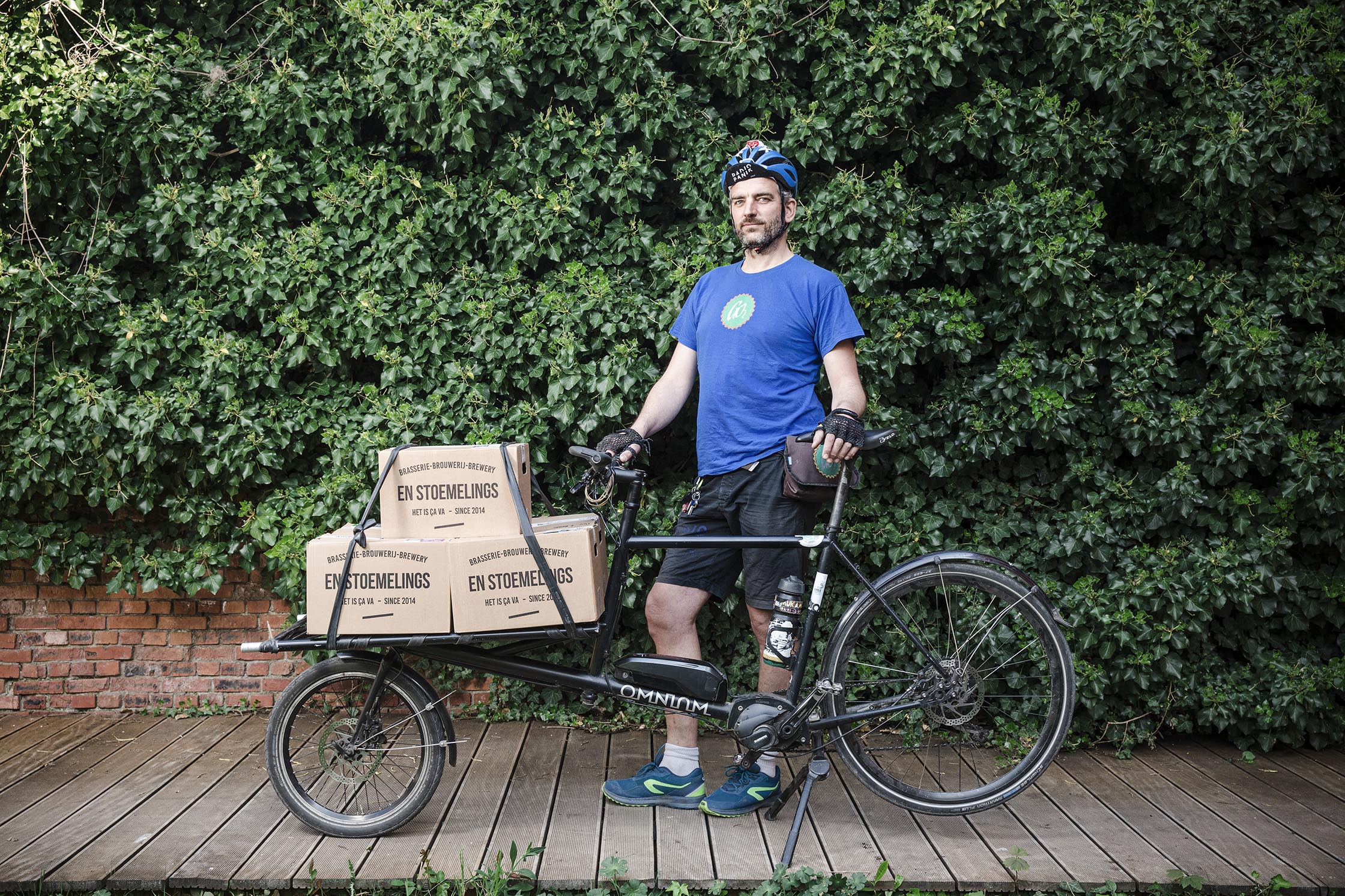
Keeping in touch during the Zoom era
Jean-Philippe admits that it was at the beginning of the quarantine that he suffered the most. He experienced surges of stress while still visiting a couple of friends with a baby. When they decided to avoid visits, he found himself in silence. Baptistine, who has not seen her partner since March 6th reveals: "We avoid seeing each other because we both work in contact with other people, even though it's minimal. He's going to visit his elderly parents and we don't want to expose them to any extra risks. When the lockdown is lifted, the first thing I will do will be to go to see him in Walloon Brabant."
Where physical contact has been limited, technology has compensated, with an initial flood of meetings on Whatsapp, Google Hangouts and Zoom. Jean-Philippe, initially reluctant to use digital communication, became so addicted after his first connection to Zoom that he now organises online sessions with his family to play Werewolves (a card game in which "wolves" and "villagers" fight one another). In terms of customer contact, the majority of recipients are now private customers, who are constantly changing. Relationships have been changed. Gaining entry into buildings, signing for parcels and, in many cases, even eye contact has been eliminated. Customers often just settle for a voice on the intercom.
Jack, reflecting on new routines, says: "The few times that people do come down to collect the package, some, even from afar, hold their breath. And I started doing it too." Among these rare encounters, Jack remembers a lady in Ixelles, who opened the door as if she was working in an infectious disease unit: "She was wearing thick gloves, a hard plastic visor and held a towel in her hands that she picked up the package with. She looked like the lead character from a dystopian film." For Baptistine, despite the unusual conditions, the couriers manage to work well "because we were already very experienced in the methods of mutual aid. If a colleague on the street is in trouble, there's always someone who's ready to go to help them."
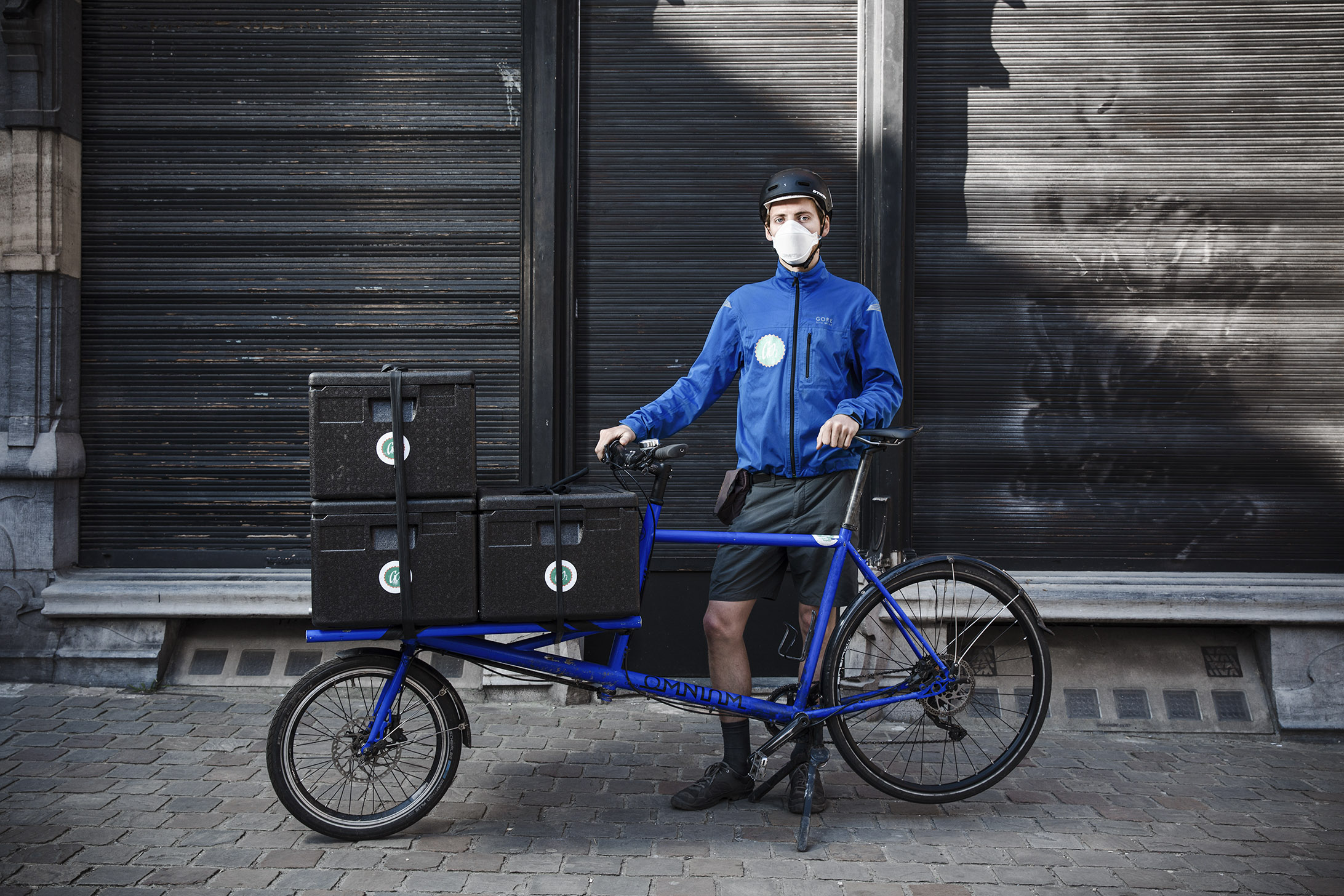
Beer and Donations
En Stoemelings is not the only brewery that is dedicating its time to home delivery. For instance, the Brussels Beer Project have organised deliveries through Belgian postal service Bpost, and the Brasserie de la Senne relies on collection by appointment from its warehouse at Tour & Taxis. In a back and forth of crates, En Stoemelings distributes bottles from other breweries, who could not handle deliveries due to having even smaller spaces. "I believe in a positive decline based on collaboration rather than competition," says Denys. “That's why our proposal for cooperation with other local breweries works. We are all part of a small world and it would be selfish not to help each other."
The Laeken brewery, as Giulia mentioned to me, combined the sale of beers with the collection of donations, intended primarily for the Saint-Pierre Hospital. "My partner and I were born there," says Denys. "And a few years ago, it was my daughter's turn to be born there. The medical staff were on the front line in the fight against Covid-19, it seemed natural to pay them the money we collected." This amounts to about 2,000 euros in donations collected by En Stoemelings for the hospital. Denys proudly shows me the letter sent by the hospital management to thank all the donors for enabling the opening of a new intensive care unit. Given the amount of money received from all donors (about 4 million euros), the Saint-Pierre management team has asked donors to now give generously other organizations involved in research or to support those from less privileged backgrounds. Denys then decided to transfer the subsequent donations to Douche Flux, an association who work to care for the homeless. "I think that associating beers with donations helps people think that they can make a difference," says Baptistine. "And in knowing that, we work with more conviction."
But why are so many beers delivered? According to Denys, the Belgians have beer running through their blood.
Featured cover photo: Serena Vittorini
Translated from Vivre avec le virus grâce à la bière et au vélo



